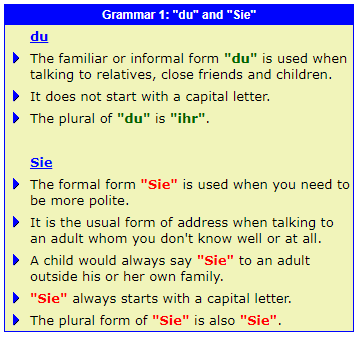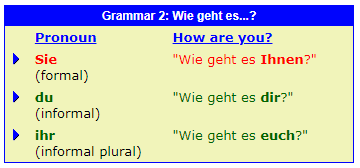1. The German language has different ways of translating the English pronoun "you":
2. Whether to use "Sie" or "du" can be a terrible dilemma for native and non-native speakers alike. It is quite possible for two neighbours to live next door to each other for decades and still call each other "Herr X" or "Frau Y" and refer to each other using "Sie"!
It is equally possible for two colleagues to work in the same office all their life and still call each other "Sie" and not be on first name terms. As the "Sie" form carries with it great respect, it thus remains the norm amongst employees, although there is a growing trend towards work colleagues being on first name terms with each other and as a consequence using the "du" form.
When meeting someone in a work environment, you should always use "Sie". The inappropriate use of "du" to someone in a position of authority in a German-speaking country can appear disrespectful and cause a great deal of offence. When getting to know new friends and colleagues, it is advisable to wait for the German speaker to ask you to address them with "du", which should then be interpreted as an offer of friendship.

3. In other areas of social interaction however, you will be expected to use "du", and may be seen as being cold and aloof if you do not.
University students invariably call each other "du" even when they're meeting for the first time, as do members of certain other groups which place a high value on solidarity (e.g. blue-collar workers, soldiers, sportsmen).
How are you?
The choice between "du" and "Sie" is not just one of social niceties. It also affects the grammar of a sentence - and verb endings in particular. Even an apparently simple construction like "How are you" needs to be remembered in three ways:

1. You will discover in subsequent chapters that "Ihnen", "dir" and "euch" are the dative forms of "Sie", "du" and "ihr". "Wie geht es Ihnen / dir?" literally means: "How goes it for you?"
 英语
英语 日语
日语 韩语
韩语 法语
法语 西班牙语
西班牙语 意大利语
意大利语 阿拉伯语
阿拉伯语 葡萄牙语
葡萄牙语 越南语
越南语 俄语
俄语 芬兰语
芬兰语 泰语
泰语 丹麦语
丹麦语 对外汉语
对外汉语

